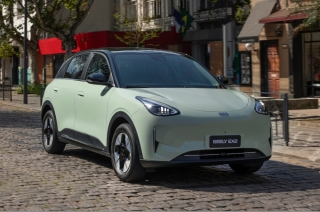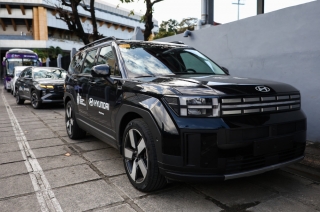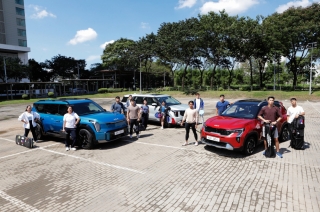
Amidst a growing fuel crisis and a steady increase in fuel prices, Honda and Isuzu have agreed to team up to make alternative-fueled commercial vehicles for the future. The Japanese brand duo wants to also meet the demand for reduced exhaust gas/carbon emissions from mobility products.
Together, the two carmakers will work on hydrogen fuel cell-powered vehicles. The fuel cells (FC) are swappable – an advantage over electric vehicle batteries that need hours of charging. One has to do is swap out the empty FC for a full one. It’s convenient and brings it much closer to how combustion engines fuel up. FC vehicles are also very clean as clean water is the only by-product after the combustion process.
Currently, however, FC technology is hindered by the cost of production and lack of infrastructure to easily recharge and swap fuel cells between vehicles.
Separately, Isuzu has been striving to promote the utilization of low-carbon and sustainable energy. It has been researching and developing various powertrains including clean diesel engines, engines that run on natural gas, and electric vehicle powertrains. These can accommodate a broad range of customer needs and how vehicles are used.
Honda, on the other hand, has been researching and developing hybrid, battery-electric vehicles, and FC vehicles for more than 30 years. The brand’s end goal is to work for the realization of a carbon-free society.
With the unified goal of creating FC vehicles, the two companies will strive to establish the foundation for basic technologies such as an FC powertrain and vehicle control technologies. The joint research of the two will focus on creating clean, low-noise, and low-vibration heavy-duty trucks. The two Japanese brands also want to promote the use of FC trucks and hydrogen energy as a means of contributing to the future prosperity of the logistics industry.
In hindsight, other automakers have already explored the use of fuel cells in cars. Hyundai already has an FC vehicle available for sale since 2013 in the form of the ix35 FCEV and the Nexo. Battery technology has also seen advancements. Solid-state batteries have risen in prominence coming with higher capacities and safer form factors. Together, all these advancements are all in the spirit of cleaner emissions.
Latest News
-
Geely’s EX2 EV headed to Australia — is a Philippine launch possible? / News
The Geely EX2 is confirmed to go on sale in Australia in 2026. Could a launch in the Philippines also be on the cards?
-
Hyundai Motor Philippines is the FIFA Futsal Women's Teams' official mobility partner / News
Hyundai Motor Philippines strengthened its partnership with FIFA through its support of the FIFA Futsal Women's Teams.
-
Kia Philippines backs EJ Obiena as Atletang Ayala continues championing Filipino athletes / News
Kia Philippines strengthens its support for EJ Obiena, backing the Olympian with dedicated mobility at home and abroad.
Popular Articles
-
Electric Vehicles in the Philippines for under P1 million
Jerome Tresvalles · Aug 19, 2025
-
Top 3 Cars For Every Lifestyle—What Cars Are Right For You? | Behind a Desk
Caco Tirona · Apr 24, 2024
-
5 Tips to Maximize Fuel Efficiency
Jerome Tresvalles · Sep 09, 2024
-
Five driving habits that are draining your fuel tank
Jerome Tresvalles · Jun 24, 2025
-
Can engine braking harm your engine?
Jerome Tresvalles · Sep 11, 2025
-
Do electric cars even need maintenance?
Jerome Tresvalles · Oct 23, 2024
-
Best vehicles for an active outdoor lifestyle
Shaynah Miranda · Jul 25, 2024
-
How to drive different types of vehicle transmissions
May 23, 2024
-
5 easy ways to keep your car interior clean
Allysa Mae Zulueta · Nov 15, 2021
-
How to survive Metro Manila traffic
Earl Lee · Aug 16, 2022



